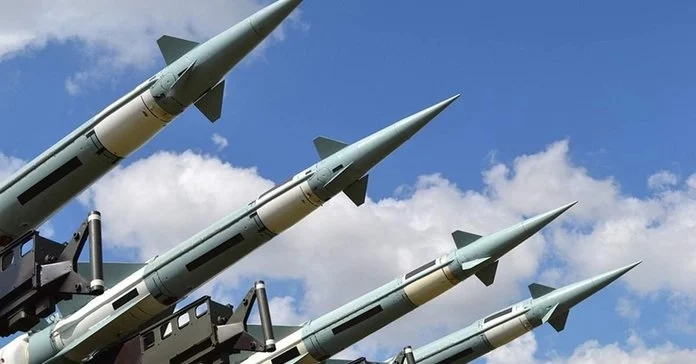During his whirlwind visits in recent days to several European countries, President Volodymyr Zelensky had a number of important meetings with European leaders. What has passed largely unnoticed, however, is that he also finally met for the first time, albeit briefly, with the leader of the Belarusian opposition Sviatlana Tsikhanouskaya.
Their encounter at the awarding of the Charlemagne Prize to the Ukrainian people in the German city of Aachen on May 14 and in the presence of numerous European leaders was potentially of high political significance. Moreover, it occurred when the Belarusian dictator and vassal of Moscow Aleksandr Lukashenko had reportedly been hospitalized fueling speculation about the state of his health and what awaits Belarus in the event of his passing.
But what might have been a long-awaited public manifestation of solidarity in the fight against a common enemy – autocracy in league with Russian imperialism – did not live up to expectations. And the big question is why? What stands behind Kyiv’s reluctance to recognize the Belarusian opposition as an ally and to make common cause with it?
On the surface, Tsikhanouskaya, who is widely believed to have won the presidential elections in her country in August 2000, would seem to be a natural ally of Zelensky and Ukraine.
Belarus remains under a repressive regime backed by Moscow. After the harsh crackdown on the Belarusian peaceful democratic revolution triggered by Lukashenko’s rigging of the voting, some 1,500 of her compatriots, including her husband Sergei, remain political prisoners.
Australia Says Would Consider Joining Peacekeeping in Ukraine
Lukashenko, propped up Moscow, has openly allowed the Russians to use Belarus as a staging area in its war against Ukraine. He has even declared his readiness to have not only Russian troops, military aircraft and missiles deployed on his territory, but even Moscow’s tactical nuclear weapons.
Many thousands of Belarusians have been forced to leave their country. Some have formed volunteer battalions and continue to fight bravely alongside Ukrainian forces against the Russians. Zelensky himself told Italian journalists and TV viewers while in Rome on May 13 that 70 perecent of the Belarusian population are against Russia and side with Ukraine.
Yet, for some reason the Zelensky administration has failed to embrace Tsikhanouskaya and the Belarusian opposition and invite their representatives to Kyiv. In the meantime, she and her colleagues are warmly greeted in Western capitals and last year she herself was a co-recipient of the Charlemagne Prize.
Like Zelensky, Tsikhanouskaya, was a newcomer to politics, catapulted into the Belarusian presidential elections when her husband was arrested after declaring himself a candidate. Consequently, she may have made tactical mistakes in the early stages of her leadership in exile of the opposition by not identifying herself more clearly with Ukraine in its stand-off with Russia, as some Ukrainian commentators stated at the time.
But since Russia launched its all-out war, she has stressed over and over that the patriotic and democratic Belarusian opposition support Ukraine, condemn Lukashenko’s complicity in Russia’s aggression against it, and also see their country’s future as linked with democratic Europe.
On the eve of this year’s Charlemagne Prize ceremony, Tsikhanouskaya tweeted: Congratulations to @ZelenskyyUa and the People of Ukraine for being awarded the International Charlemagne Prize Award 2023.
The next day, she tweeted: “I was honored to meet President @ZelenskyyUa today in #Aachen & to congratulate him on this year’s @KarlspreisAC. We stand united with Ukraine…”
In another tweet, she showed her actual handshake with Zelensky, but it is clear from it that the Ukrainian president simply responded as courtesy and protocol demanded and did not engage in any discussion with her.
Tsikhanouskaya’s representatives have since described their encounter as “historic.” Yet what is striking is that in the detailed account of the Charlemagne Prize ceremony published on Zelensky’s official website later that day omits any mention of the meeting with Tsikhanouskaya.
Nor does it mention the president’s meeting at the same event with the wife of another leading Belarusian political prisoner, Veronica Tsepkalo, who was awarded the Charlemagne Prize last year together with Tsikhanouskaya and one other.
Zelensky actually posed for a photo with her which she published on Twitter adding: Congratulations to President #Zelentski (sic) and all #Ukrainian people with the prestigious #karlspreis2023 for the fight for peace, freedom, democracy and European values. Our hearts and prayers with #Ukraineis (sic) who are going to win this war! #Belarus will also be free.”
So, unless there something going on behind the scenes that we are unaware of, it is high time to also let the Belarusian people know that Ukraine is with them as they seek to free themselves from dictatorship and Moscow’s stranglehold.
The de facto foreign minister in the Belarusian opposition movement headed by Tsikhanouskaya, Pavel Latushka, has reminded Ukraine and the world in an interview for @RaiPortaaPortata that: “…Belarusians are against 🇷🇺 & support Ukraine, Belarusians are fighting… this is also a war.” Without #FreeBelarus, regional security in Europe is not possible. Slava Ukraïni! Žyvie Biełaruś!
President Zelensky, Foreign Minister Kuleba – What is going on?
You can also highlight the text and press Ctrl + Enter











